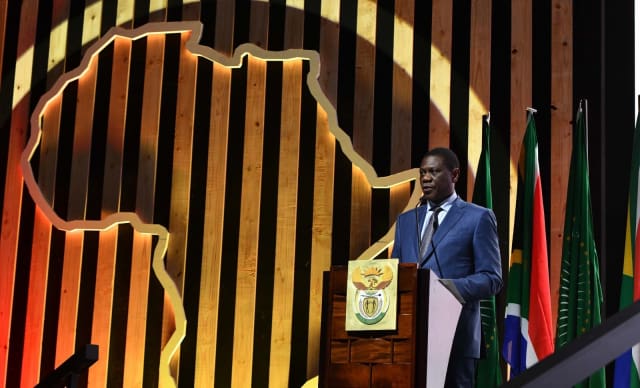South Africa and China are at a crucial juncture in redefining their economic partnership, moving from a focus on raw material trade to a collaborative approach to industrialisation.
This is according to Deputy President Paul Mashatile, who was speaking during a working dinner with the Insurance Corporation of British Columbia (ICBC) and Standard Bank at the China World Summit Wing Hotel Conference Hall in Beijing.
“South Africa and China are at a pivotal moment to redefine our economic partnership, from raw material trade to co-industrialisation. Together, we can pave the way for a brighter future that brings prosperity to our people and strengthens the bonds between our nations.“
The Deputy President emphasised the need for collaboration in strategic sectors to promote investment and trade in areas such as battery manufacturing, critical minerals, renewable energy, green hydrogen, infrastructure, rail modernisation, and metallurgy revitalisation.
“South Africa presents significant investment opportunities in metallurgy and smelter revitalisation, driven by its rich mineral resources and the global shift towards a low-carbon economy.
“Let us turn commitments into concrete projects that create jobs, transfer technology, and position South Africa as China’s gateway to Africa.”
Mashatile is currently in China for a strategic working visit.
The purpose of the visit, which began on Monday, is to strengthen bilateral relations and enhance economic cooperation between South Africa and China.
He told the attendees that the gathering signifies the importance of fostering strong partnerships between South Africa and China in strategic sectors for investment and trade promotion.
“With the diversified resources of South Africa and the economic strength of China, there is a great deal that we can accomplish together. We must augment our collaboration, especially in critical industries poised for investment and trade.”
Currently, the Deputy President stated that South Africa and China have strong economic cooperation, with bilateral commerce amounting to US$34 billion in 2024 and Chinese foreign direct investment in South Africa being US$13.21 billion.
The Deputy President believes that this partnership is characterised by a growing trade relationship, with China being South Africa’s largest trading partner for 16 consecutive years.
“A notable aspect of the trade relationship is the trade imbalance, where South Africa exports primarily raw materials to China and imports manufactured goods, creating a trade deficit for South Africa. South Africa needs to benefit more from its active, albeit highly unequal, trading partnership with China,” he said.
He said the dinner presented a strategic opportunity to leverage the institutions’ financial expertise and advisory market insights to deepen investment in SA’s priority sectors and to also address trade imbalances by promoting value-added exports and technology transfer.
The Deputy President said the platform was crucial to advancing partnerships in renewable energy, critical minerals, infrastructure, and manufacturing under the Forum on China-Africa Cooperation (FOCAC) framework.
“Through the process of recognising and capitalising on these key sectors, we can create an environment in which both of our economies benefit and in which we make progress towards our common objectives.
“I am certain that the many areas of expertise and knowledge that have been collected around these tables will make it possible for us to devise specific plans and strategies that can be put into action, which will propel our partnership ahead.”
He also highlighted some opportunities in green industrialisation, infrastructure financing, and export diversification.
“In addition to a rapidly expanding renewable energy industry, the country’s plentiful natural resources, which include minerals that are essential for the development of environmentally friendly technology, provide a solid basis for the expansion of green industrialisation.”
Meanwhile, he stressed that strategic investments in infrastructure, particularly in water and sanitation, and a focus on export diversification can further drive sustainable economic development and job creation.
Mashatile said there was potential for South Africa and China to work together to foster innovation, the transfer of technology, and the development of skills.
“There is the potential for us to form partnerships that are beneficial to both parties if we capitalise on our skills and explore new ways of working together.
“Through partnership and working together for a common purpose, we can realise the full potential of both our countries.” – SAnews.gov.za

